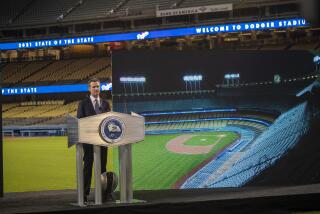THE GORBACHEVS IN CALIFORNIA : Gorbachev at Stanford: California Is ‘Special’
- Share via
Here is a partial text of Soviet President Mikhail S. Gorbachev’s address at Stanford University:
Ladies and gentleman, I’m very pleased that within the framework of my state visit to the United States, I am here among you within the walls of (this) world-famous university. Thank you for your warm hospitality.
I think that those who work or study in your university are doubly lucky it is in California. . . . California is a special place, even by international standards.
And I’m saying this not just by way of a compliment and to say pleasant things to the governor of this state, who is here with his wife. I think I am just stating a fact. It is said that only five countries in the world produce a greater gross output than your state. The ideas and technologies of tomorrow are born here in California. California is closely linked economically with Europe, Asia and Latin America.
The Role of the U.N.
So, this is a good place to live and for me an appropriate place for discussing how the Soviet Union and the United States have positioned themselves on the dividing line between the centuries and the eras on the coasts of the Pacific . . . described as the Mediterranean of the future. It is appropriate now to ponder the destinies of the world, since it was here in San Francisco the United Nations was founded precisely 45 years ago.
I think this is symbolic, that it is this sunny city that was selected as the place . . . to . . . proclaim the foundation, the establishment of this organization whose efficiency we all need very much.
Let us look at the conclusions drawn that time, right after the horrible war. The United Nations was set up to . . . remove the political, economic and social causes of war . . . to promote relations among nations . . . on the equal rights and self-determination of peoples, with respect for human rights. . . .
It is only now that international politics is really starting to adjust itself to these ideologies and principles, and all of us felt how much we need the United Nations if we really are to move the world. . . . For a long time, the Pacific was a center of confrontations and the arms race. . . . Nations found themselves on the opposite sides of the barricades of ancient revolutions. But new winds are now blowing. . . . The Japanese and Koreans and Chinese and other Asian peoples have lessons for the entire world to learn. . . .
After the Cold War
Let us think about the future. . . . I am under no illusions regarding the possibility of faster convergence (of) societies . . . They probably will never be fully alike. There is no need for that. . . .
The Cold War is now behind us. Let us not wrangle over who won it. . . .
There was a time when military procurement orders were considered--are still considered by some--to be the best incentive for economic and technological progress. . . . (In the 1970s) Santa Clara County, which was first in per-capita military contracts, began to explore ways of demilitarizing the local economy. I hope that as Soviet-American relations improve . . . participation in the arms race will become a thing of the past . . . not only for your beautiful state but both our great powers.
Science has played a major role in the arms race. Science was the first to seek out . . . and to look for a way out. . . . Here we have to give credit to the joint efforts of Soviet and American scientists, to which Stanford University scientists have made a very substantial contribution in their program for the development of the basic principles for such concepts as international security and strategic stability.
Without a . . . similar and objective approach to defining strategic stability and national security, without a scientific analysis taking into account all factors--economic, political, scientific, military, technical and political-military--it is impossible to make the right decisions on . . . nuclear and conventional arms reductions.
The scientists of our two countries worked together to make the necessary estimates and discussed them over and over again. They . . . put aside the political and military ambitions which had long stood in the way of a solution. Thus they have arrived at major political decisions, including those adopted over these days in Washington. . . .
More to Read
Sign up for Essential California
The most important California stories and recommendations in your inbox every morning.
You may occasionally receive promotional content from the Los Angeles Times.













